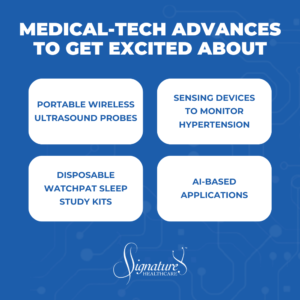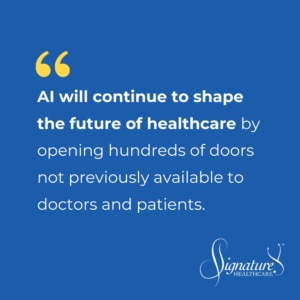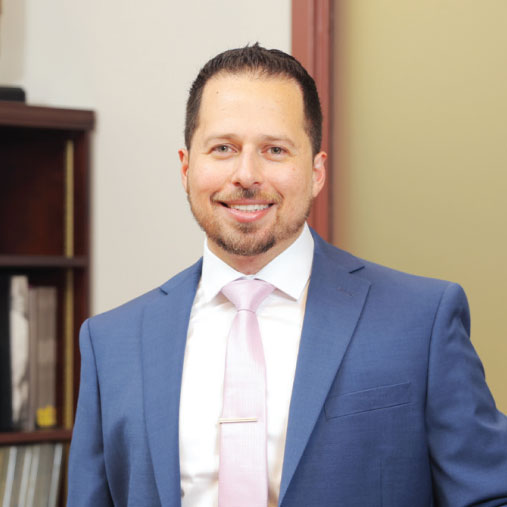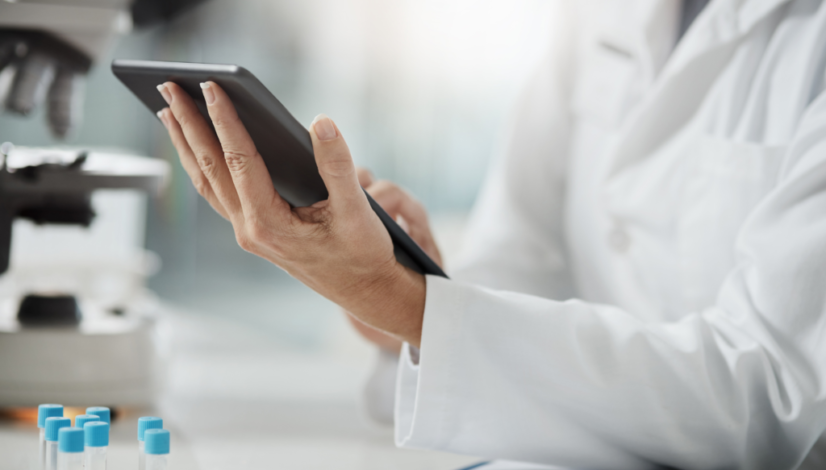Medical Technology Brings a Human Touch to Patient Care
Some kids are obsessed with soccer, some with sharks. When I was young, my obsession was “all things tech.” And today, as an internist, my years-long interest in technology has become a passion for biotechnological applications in medicine.
I regularly explore how I can use biotech in my patients’ best interests, either at the point of care or soon after an encounter. With some of the exciting new devices available in primary care, we can rely less on referring patients to a string of subspecialists to prevent or relieve certain medical conditions.
Here are some medical-tech advances I’m especially excited about:

Point-of-Care Ultrasound
Point-of-care ultrasound is one of the most revolutionary advances shaping the practice of primary care and outpatient internal medicine. I use portable ultrasound probes, small enough to carry in my white coat pocket and connect to a screen via Wi-Fi or cable.
With simple training on how to use these probes and interpret resulting images, doctors receive actionable information remarkably quickly. With a point-of-care ultrasound probe connected to my phone, I can see full-body imaging and get answers to clinical questions that previously called for a range of diagnostic tests via X-ray, CT, or MRI.
For example, in a patient with abdominal pain, I can use the probe to examine the gallbladder for gallstones or evidence of inflammation and infection. The probe might also help me guide an injection into a joint or diagnose dangerous venous clots for prompt treatment.
Monitoring Hypertension (High Blood Pressure)
Patients with hypertension sometimes find it challenging to monitor their own blood pressure regularly. This means physicians can’t get a consistent look at their data, which affects our ability to treat them properly.
Very soon in the U.S., we’ll have the ability to fit patients with a sensing device that monitors their pulse and delivers the same green-light optical readings as a smartwatch or bracelet. The patient won’t need to worry about checking their blood pressure — using artificial intelligence (AI), we’ll gather an unprecedented range of algorithmic data about their blood pressure from the shape of their arteries.
Studying Sleep Patterns
Most doctors are concerned about obstructive sleep apnea, an affliction quite prevalent among patients today. Now, we can offer patients a disposable WatchPAT sleep study kit, which can be worn for two nights in the comfort of their home.
The kit detects sleep apnea and delivers prompt, precise, and accurate results on sleep patterns and severity of sleep apnea if present, so we’re prepared to treat the patient accordingly.
The Limitless Promise of AI
Emerging AI-based applications are driving the biotech revolution. AI will continue to shape the future of healthcare by opening hundreds of doors not previously available to doctors and patients.
We’ll collect not just more data, but more usable data. And we’ll be able to interpret it in new ways, from examining specimens to identifying patterns, all pointing us to more accurate outcomes.
For example, take a case where tissue analysis is needed to make a very specific medical diagnosis. Based on signals from the point-of-care ultrasound, AI delivers a series of tissue planes delineating skin, fat, tendons, muscle, and blood vessels in full color, where previously we’d seen only shades of gray, black, and white.
AI consolidates and presents patient data clearly, allowing us to make better sense of it without the need for extensive training.

Getting You Comfortable With Biotech
Finding the Right App for You
Within a concierge practice, most patients tend to be quite involved in their healthcare. They’re enthusiastic to hear about new apps that give them more data or help them take action to slow or prevent illness.
For some patients, the sheer volume of technology options available is overwhelming. Which ones might help me? Which are mostly hype? Occasionally, we hear skepticism or uncertainty about devices like implantable tech.
If you’re interested in exploring proven, innovative tech to benefit your health, have an open, honest conversation with your concierge physician. Because of our close relationship with you, we’re uniquely more qualified than a traditional practice to introduce you to wearable technology that’s right for your specific needs.
Of course, not every app is appropriate for everyone, which can disappoint patients who want as much data as possible. Many devices are not yet FDA-approved or covered by insurance, and although the latest diagnostic tools can be excellent indicators, they can’t yet completely replace the more traditional means of confirming a diagnosis.
Your concierge doctor can set your expectations for what’s realistic… and where an app may be the beneficial tool you’re looking for.
The Attention You Deserve
In a busy traditional medical practice, how often did you try to communicate with a doctor who was busy typing away at a computer screen?
This detachment is off-putting. The doctor may capture the details of your visit, but at the expense of an authentic human connection. And while documenting on the fly, the doctor may miss specific details of your narrative, which can hurt your quality of care.
Concierge practice allows us extra time to engage with patients in the office and exam room, and AI helps us capture those conversations in a natural way.
We can listen to your symptoms, ask clarifying questions, detail your history, perform a physical exam, guide you through our findings, and discuss a diagnosis — all while a medical scribing tool like Freed.ai can detail the entire encounter.
AI applies context and comprehensive notes that would otherwise take much more time to complete. While our medical records are captured precisely and efficiently, we’re able to be present for you, so you feel seen and heard.
The Early Adopters
Signature Healthcare is part of an international network of concierge practices, so we have a global connection to innovative biotech.
We’re frequent early adopters of proven-useful technologies. We’re keen to share advances or participate in testing and applying them. We have the connections and time to scrutinize tools critically, obtain data, see how others apply them, and intuit how they may help our patients.
Are you interested in how new medical technology may benefit your health and wellness? Reach out. I’m always eager to discuss.

Dr. Andrés Sánchez
Dr. Sánchez is board-certified in Internal Medicine. Originally from Medellin, Colombia, Dr. Sánchez immigrated to Miami, FL at the age of 11. Dr. Sánchez obtained a Bachelor of Science Degree in Biochemistry from the University of Florida, went on to receive a Dean’s Fellowship to earn his Doctor of Medicine Degree at the University of Rochester School of Medicine, and completed his internal medicine residency at Yale University.
What drives Dr. Sánchez’s way of life, including his practice of medicine, is his Christian faith, which encourages him to exercise grace and compassion in the care of his patients. He enjoys playing the cajón and spending quality time with his wife Cristina, son Caleb, and his church family. Dr. Sánchez makes it a priority to keep up-to-date with medical knowledge and biotechnological advances because he understands how the timely application of these can translate to relieve the suffering of his patients. Dr. Sánchez is fluent in English and Spanish.
Get the latest News
Join the Signature Healthcare Newsletter to get the latest articles, resources, and news delivered directly to your inbox.

